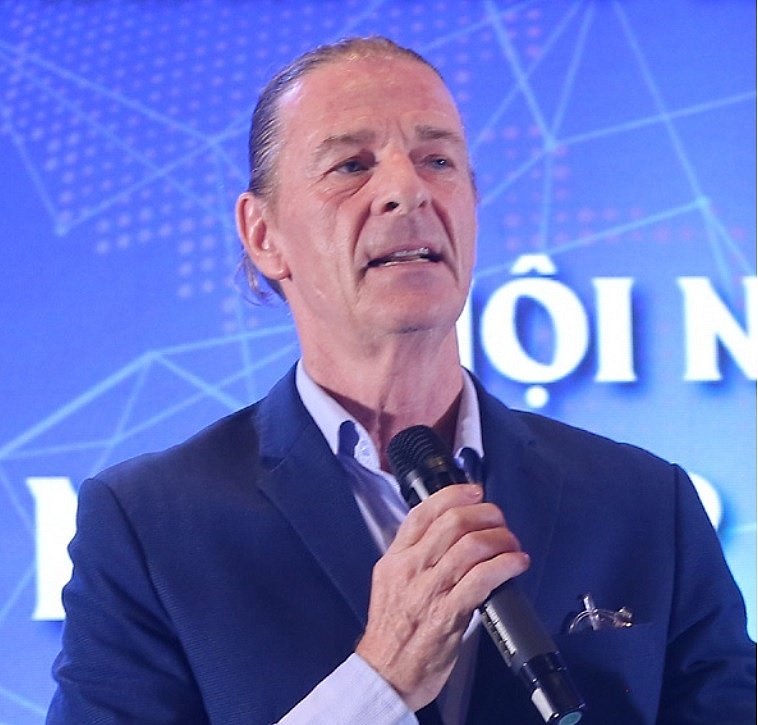Addressing ESG principles at the corporate level
How has the global trend of sustainable development evolved this year, especially in the context of environmental, social and governance (ESG) standards?
 |
| Dominic Scriven, chairman of Dragon Capital |
This year, the ESG framework has remained a pivotal topic globally. However, recent challenges have spurred some debate. The pandemic, economic downturns, and geopolitical conflicts have given rise to scepticism, including concerns about greenwashing and the feasibility of ESG goals.
Critics argue that focusing on business, especially during economic recessions, might impede profitability, let alone pursuing socially and environmentally intensive activities. This scepticism has led to legal actions in the US against fund managers for divesting from coal mining stocks - a sector considered environmentally detrimental - and such investments being incompatible with ESG commitments.
These counter-reactions highlight the dilemma and responsibility of executives pursuing ESG goals, presenting a significant challenge for businesses and society in adhering to these principles.
What are the major challenges Vietnam faces in achieving its carbon market and net-zero targets by 2050?
Climate change poses a significant challenge within the ESG framework. To mitigate climate change, there’s a global focus on fair energy transition cooperation. As a developing country, Vietnam’s enormous energy needs for growth are evident in its increasing electricity consumption.
The key questions revolve around how and when this transition can be achieved and whether it’s feasible. Financing the transition is another major hurdle. Both public and private sectors need to mobilise substantial resources for this energy transition.
According to the World Bank’s 2022 report, Vietnam requires an additional investment of about 6.8 per cent of its GDP, roughly $368 billion, by 2040 for green investments towards net-zero. This includes $130 billion from government budgets, $184 billion from the private sector, and the remaining $64 billion from foreign aid. This transition demands proactive government involvement and collaboration between public and private institutions to explore financial mechanisms supporting this change.
Overcoming these challenges will mark a significant step in developing clean and sustainable energy for Vietnam’s future. While the path ahead is filled with challenges, Vietnam’s ambitious and decisive steps are in sync with global trends, reflecting a commitment to a sustainable future.
How are businesses addressing the ESG standards at the corporate level?
Corporate response to ESG standards, particularly in Vietnam, reflects a nascent but growing commitment. The country aligns with several Asian counterparts in adopting government-led initiatives to counter climate change, such as emission reduction and carbon credit initiatives.
However, the motivation among Vietnamese businesses to adopt these practices remains moderately enthusiastic at best. This contrasts with Europe, where businesses face direct impacts from carbon taxes on specific export commodities like aluminium and steel.
Such measures, although currently limited, signal a trend towards more comprehensive and stringent environmental regulations. Vietnamese companies have not yet felt the full force of these changes, partly due to the absence of similar economic, legal, or trade pressures and a lack of financial incentives for green practices.
At Dragon Capital, there’s a growing chorus of voices from both local and international clients demanding stringent adherence to ESG principles in our investment strategies. The challenge lies in effectively measuring emissions in our portfolios due to the general lack of such practices in the businesses we invest in.
Consequently, we’ve resorted to collaborating with international firms to benchmark our portfolio companies against global peers, a task that’s both challenging and crucial in meeting our clients’ demands for ESG compliance and transparency.
What is the evolving role of stock exchanges in promoting climate-related financial disclosures?
Stock exchanges across the globe and in the Asian region are increasingly focusing on the enforcement and support of climate-related financial disclosures, guided by a task force on climate-related financial disclosures. The framework, with its focus on governance, strategy, risk management, and metrics, places significant emphasis on corporate governance. It advocates for a detailed description of how company boards oversee climate risks and opportunities, and the role of executive management in these areas.
This approach indicates a growing expectation for corporate boards to integrate ESG and climate considerations into their strategic discussions, anticipating stakeholder scrutiny on their climate risk management and emissions reduction strategies.
Developing a culture and mindset within companies that prioritise effective ESG practices requires a heightened level of commitment from the board of directors. Businesses looking to attract quality, long-term investment need to view ESG and green transitions not as financial burdens but as strategic opportunities.
By adapting to these changes, companies can enhance their competitive edge, satisfy stakeholder expectations, address societal challenges, and create a positive environmental and social impact – essential components of modern corporate social responsibility.
 | ESG in M&As: from global to Vietnam In the world of M&A, both in the global and local context, environmental, social, and governance (ESG) considerations are becoming increasingly important. |
 | Top strategies to employ for integration of ESG aspects Environmental, social, and governance (ESG) criteria are becoming increasingly important to Vietnamese businesses, with around 80 per cent having already made commitments to these criteria or planning to do so shortly. |
What the stars mean:
★ Poor ★ ★ Promising ★★★ Good ★★★★ Very good ★★★★★ Exceptional
 Tag:
Tag:
Related Contents
Latest News
More News
- Private capital funds as cornerstone of IFC plans (February 20, 2026 | 14:38)
- Priorities for building credibility and momentum within Vietnamese IFCs (February 20, 2026 | 14:29)
- How Hong Kong can bridge critical financial centre gaps (February 20, 2026 | 14:22)
- All global experiences useful for Vietnam’s international financial hub (February 20, 2026 | 14:16)
- Raised ties reaffirm strategic trust (February 20, 2026 | 14:06)
- Sustained growth can translate into income gains (February 19, 2026 | 18:55)
- The vision to maintain a stable monetary policy (February 19, 2026 | 08:50)
- Banking sector faces data governance hurdles in AI transition (February 19, 2026 | 08:00)
- AI leading to shift in banking roles (February 18, 2026 | 19:54)
- Digital banking enters season of transformation (February 16, 2026 | 09:00)




















 Mobile Version
Mobile Version